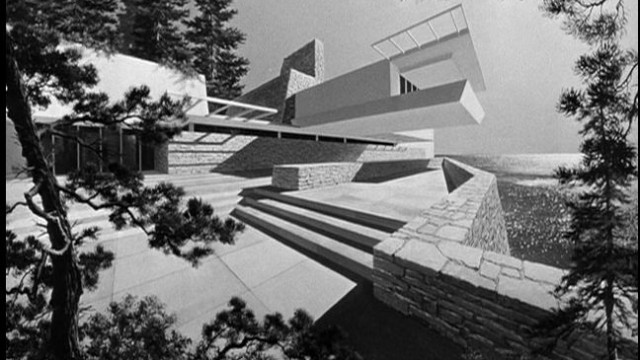Howard Roark is the protagonist of Ayn Rand’s novel, The Fountainhead (1943). Roark is an individualistic architect working in the modernist style. His belief in the integrity of his designs, and his refusal to compromise, mean that he faces obscurity and hardship, in spite of his considerable talents. In the long run, however, Roark is able to design landmark buildings whilst staying true to his ideals. Roark’s personality, career, and artistic style represents the individual against the collective. He refuses to submit to convention, popular opinion, mediocrity, compromise, power, or established wisdom. He is an unashamed egoist, living his life solely to pursue his own creativity and happiness.
For Roark, true art comes from the unmitigated vision of the individual, whose mind can serve as a “fountainhead” of creativity. This is reflected in his original, ahistorical, and unorthodox style, based on the notions of form following function and the visual expression of structure, with an emphasis on clarity and simplicity. Roark’s style of architecture is based on the work of Frank Lloyd Wright, and elements of Roark’s life (particularly with regard to his career) mirror that of Wright’s. The above picture is a still from the 1949 film adaption of the Fountainhead. The style of this building (a home designed by Roark) shares features with Wright’s famous “Falling Water”.
1) Independence is the only gauge of human virtue and value. What a man is and makes of himself; not what he has or hasn’t done for others. There is no substitute for personal dignity. There is no standard of personal dignity except independence.
2) I set my own standards. I inherit nothing. I stand at the end of no tradition. I may, perhaps, stand at the beginning of one.
3) I don’t intend to build in order to have clients; I intend to have clients in order to build.
4) Throughout the centuries there were men who took first steps down new roads armed with nothing but their own vision. Their goals differed, but they all had this in common: that the step was first, the road new, the vision unborrowed, and the response they received-hatred. The great creators-the thinkers, the artists, the scientists, the inventors-stood alone against the men of their time. Every great new thought was opposed. Every great new invention was denounced. The first motor was considered foolish. The first airplane was considered impossible. The power loom was considered vicious. Anaesthesia was considered sinful. But the men of unborrowed vision went ahead. They fought, they suffered and they paid. But they won.
The creators were not selfless. It is the whole secret of their power-that it was self-sufficient, self-motivated, self-generated. A first cause, a fount of energy, a life force, a Prime Mover. The creator served nothing and no one. He had lived for himself. And only by living for himself was he able to achieve the things which are the glory of mankind. Such is the nature of achievement.
5) The mind is an attribute of the individual. There is no such thing as a collective brain. There is no such thing as a collective thought. An agreement reached by a group of men is only a compromise or an average drawn upon many individual thoughts. It is a secondary consequence. The primary act-the process of reason-must be performed by each man alone. We can divide a meal among many men. We cannot digest it in a collective stomach. No man can use his lungs to breathe for another man. No man can use his brain to think for another. All the functions of body and spirit are private. They cannot be shared or transferred.
6) I don’t make comparisons. I never think of myself in relation to anyone else. I just refuse to measure myself as part of anything.
7) I don’t see anything evil in a desire to make money. But money is only a means to some end. If a man wants it for a personal purpose—to invest in his industry, to create, to study, to travel, to enjoy luxury—he’s completely moral. But the men who place money first go much beyond that. Personal luxury is a limited endeavour. What they want is ostentation: to show, to stun, to entertain, to impress others. They’re second-handers.
8) Men have been taught that the highest virtue is not to achieve, but to give. Yet one cannot give that which has not been created. Creation comes before distribution—or there will be nothing to distribute. The need of the creator comes before the need of any possible beneficiary. Yet we are taught to admire the second-hander who dispenses gifts he has not produced above the man who made the gifts possible. We praise an act of charity. We shrug at an act of achievement.
9) Civilization is the progress toward a society of privacy. The savage’s whole existence is public, ruled by the laws of his tribe. Civilization is the process of setting man free from men.
10) I came here to say that I do not recognize anyone’s right to one minute of my life. Nor to any part of my energy. Nor to any achievement of mine. No matter who makes the claim, how large their number or how great their need. I wished to come here and say that I am a man who does not exist for others.

